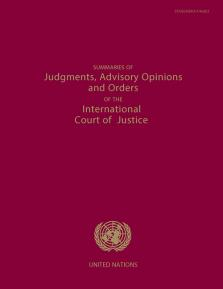International Court of Justice
The International Court of Justice (ICJ) is the principal judicial organ of the United Nations (UN). It was established in June 1945 by the Charter of the United Nations and began work in April 1946. The seat of the Court is at the Peace Palace in The Hague (Netherlands). Of the six principal organs of the United Nations, it is the only one not located in New York (United States of America). The Court’s role is to settle, in accordance with international law, legal disputes submitted to it by States and to give advisory opinions on legal questions referred to it by authorized United Nations organs and specialized agencies. The Court is composed of 15 judges, who are elected for terms of office of nine years by the United Nations General Assembly and the Security Council. It is assisted by a Registry, its administrative organ. Its official languages are English and French.
The following are some collections other than the court's website where you may search for ICJ decisions and information on the ICJ:
- International Court of Justice Cases (Westlaw)Full text of documents from the International Court of Justice (the World Court). Coverage begins with 1947. Source of this material is the ICJ's publication Report of Judgments, Advisory Opinions and Orders, last published in 2000. Selected documents beginning with 2001, as released and made available by the International Court of Justice prior to publication of the Report, are also included.
- International Court of Justice Advisory Opinions (Lexis)1948 - present, the International Court of Justice Advisory Opinions (ICJAO) file contains the full-text, English-language advisory opinions of the International Court of Justice.
- International Court of Justice Filings (Lexis)The International Court of Justice Filings (ICJDOC) file contains various full-text, English-language interim documents filed with the International Court of Justice for pending cases, including the application and written pleadings, as well as various orders of the Court, where available. Coverage begins in 2004 with written pleadings and orders from the Avena case whereby the Court eventually found that the U.S. breached its obligations to certain Mexican nationals and Mexico under International Law.
- International Court of Justice Judgments (Lexis)The International Court of Justice Judgments (ICJCC) file contains the full-text, English-language judgments of the International Court of Justice for "contentious cases"; i.e. cases between the Member States of the United Nations (currently 191). Coverage begins in 1948 with The Corfu Channel Island cases and includes those full-text judgments made available to LexisNexis by permission of the Court.
 Summaries of judgments, advisory opinions, and orders of the International Court of Justice [online resource] by Call Number: KZ213 .S86Also available in print, 1948-2012, Law Library Books - Basement
Summaries of judgments, advisory opinions, and orders of the International Court of Justice [online resource] by Call Number: KZ213 .S86Also available in print, 1948-2012, Law Library Books - BasementEnhancing the Rule of Law Through the International Court of Justice by
Call Number: KZ6275 .E54 2014ISBN: 9789004273191Publication Date: 2014-07-10The International Court of Justice and the Effectiveness of International Law by
Call Number: KZ6275 .C68 2017ISBN: 9789004312210Publication Date: 2016-12-15
Permanent Court of Aribitration
The PCA is an intergovernmental organization with 117 member states. Established in 1899 to facilitate arbitration and other forms of dispute resolution between states, the PCA has developed into a modern, multi-faceted arbitral institution that is now perfectly situated at the juncture between public and private international law to meet the rapidly evolving dispute resolution needs of the international community. Today the PCA provides services for the resolution of disputes involving various combinations of states, state entities, intergovernmental organizations, and private parties. Cases decided by the PCA can be found on their website along with other documents and resources.
The following are more resources containing cases and other information on the PCA.
The Permanent Court of Arbitration Summaries of Awards, 1999-2009 by
Call Number: KZ6183 .P47 2010ISBN: 9789067043199Publication Date: 2010-06-29The Permanent Court of Arbitration : international arbitration and dispute resolution : summaries of awards, settlement agreements, and reports by
Call Number: KZ200 .P47 1999ISBN: 9041112332Publication Date: 1999-08-01International Alternative Dispute Resolution by
Call Number: KZ6170 .I58 2000ISBN: 9041114769Publication Date: 2000-11-01
